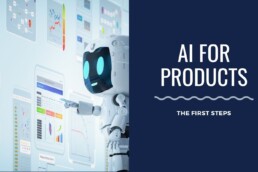I met with a senior PM at a mid-sized SaaS company last week. She echoed what I have heard from multiple people: “Everything I learned about product management five years ago feels outdated,” she confided.
“AI isn’t just changing our tools – it’s transforming how we think about products themselves.”
While we can’t predict how AI will reshape product management, clear patterns that will define our profession’s future are emerging.
- Traditional PM skills are no longer enough. Companies now expect PMs to be AI strategists, data ecosystem experts, and business leaders – all rolled into one.
- Teams using AI-powered workflows are shipping 3x faster than their competitors. The prototype-to-production cycle that once took weeks now happens in days.
- AI-driven insights and rapid experimentation replace product decisions that once relied on gut feel.
Let’s explore these shifts and what they mean for your career as a product manager.
Table of Contents
ToggleThe Rise of the AI-First Product Manager
Remember when “mobile-first” transformed product thinking? We’re at a similar inflection point with AI. But this transformation runs deeper than just adding AI features to existing products. The change is happening across two critical dimensions:
First, there’s the obvious revolution in our day-to-day work. Product managers already use AI to supercharge their productivity – from crafting user stories to analyzing customer feedback. I recently spoke with a PM who reduced his team’s discovery phase from weeks to days by using AI to analyze customer interviews and identify patterns that would have taken weeks to surface manually.
But the second dimension is where things get interesting. AI isn’t just a tool anymore – it’s becoming the core of product strategy. Think about it: AI might give your product a competitive edge today. Tomorrow? AI won’t be a differentiator; it’ll be table stakes. The real question won’t be whether to use AI but how to use it in ways that genuinely solve customer problems.
This shift demands a new kind of product thinking. Understanding feature sets and user interfaces is no longer enough.
Tomorrow’s successful PMs will need to consider AI as a strategic lever and understand its capabilities and limitations at a fundamental level.
The Birth of the Full-Stack Product Manager
“Jack of all trades, master of none” was a common criticism of product managers. Now, it’s becoming our superpower – with a twist. The modern PM needs to synthesize an even broader range of skills and knowledge.
The foundation is the traditional PM toolkit – product sense, analytics, and stakeholder management. What’s building on top of this foundation is fascinating:
On the business side, PMs are taking on more strategic roles than ever before. It’s not just about building great products; it’s about understanding market dynamics, competitive landscapes, and business models at a deeper level. In a recent workshop I conducted, over 80% of senior PMs reported spending more time on business strategy than they did two years ago.
But here’s where it gets challenging: technical literacy is becoming non-negotiable. I’m not suggesting every PM needs to become a data scientist, but understanding the data ecosystem is crucial. From data engineering to analytics to machine learning pipelines – these aren’t just IT concerns anymore. They’re product concerns.
The Process evolution
Perhaps AI’s most immediate impact is transforming product development processes. Traditional workflows are being turned on their heads. Take prototyping, for instance. Teams are increasingly skipping traditional design tools in favor of AI-powered rapid prototyping platforms.
Paul Graham recently highlighted how some teams have removed Figma from their workflow, using tools like Replit to go straight from idea to working prototype. This isn’t just about speed – fundamentally changing how we validate ideas and get feedback.
Think about what this means for traditional PM deliverables. Those carefully crafted PRDs? They’re evolving. When you can iterate on a working prototype in real-time with stakeholders, the nature of product documentation changes; it becomes more dynamic, more collaborative, and arguably more effective.
Embracing the Change
These changes might seem overwhelming. They are. However, they also represent an unprecedented opportunity for product managers willing to adapt and grow. The question isn’t whether these changes will affect your role – they will. How will you position yourself to thrive in this new landscape?
I’m seeing successful PMs approach this evolution in three ways:
- They’re investing in AI literacy as users and strategic thinkers who understand AI’s possibilities and limitations.
- They’re strengthening their technical foundations, particularly in data and API ecosystems.
- They’re experimenting with new workflows and tools, staying agile in their processes.
What’s Next?
The product management role has always been dynamic, but we’re entering a period of unprecedented change. The good news? The core of what makes a great product manager – empathy for users, strategic thinking, and the ability to execute – remains as valuable as ever. The challenge is building on these foundations to embrace new capabilities and working methods.
What changes are you seeing in your product management practice? How is AI affecting your day-to-day work? I’d love to hear your experiences and perspectives in the comments below.



